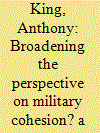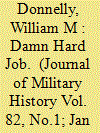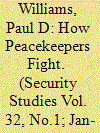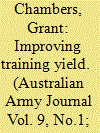|
|
|
Sort Order |
|
|
|
Items / Page
|
|
|
|
|
|
|
| Srl | Item |
| 1 |
ID:
178357


|
|
|
|
|
| Summary/Abstract |
In 2018, Ilmari Käihkö published a special collection in Armed Forces & Society on the debate about small unit cohesion. Later, in reaction to a response by Guy Siebold, he published a further intervention with Peter Haldén. Focusing on my 2006 article in the journal and my subsequent debate, Käihkö has claimed that the cohesion debate is too narrow. It ignores organizational factors in the armed forces and wider political factors, including nationalism and state policy. Consequently, it is incapable of analyzing non-Western state or irregular forces and is only relevant for the 20th and 21st centuries. This response shows that while Käihkö’s extension of the empirical archive to non-Western armed groups is to be welcomed, none of his theoretical claims are sustainable.
|
|
|
|
|
|
|
|
|
|
|
|
|
|
|
|
| 2 |
ID:
159434


|
|
|
|
|
| Summary/Abstract |
James A. Van Fleet believed that units possessing the will to win would always emerge victorious from any battle. From July 1951 to the end of his tenure as Eighth Army’s commander in Korea in February 1953, he would find that his mission of holding the line until an armistice made it difficult to maintain a will to win among U.S. Army infantrymen. Also working against him were factors arising from the Army’s manpower crisis and the tactical problems facing his infantrymen on the battlefield. Under these conditions Van Fleet was unable to keep these units “fit, ready, and eager to fight.”
|
|
|
|
|
|
|
|
|
|
|
|
|
|
|
|
| 3 |
ID:
157985


|
|
|
|
|
| Summary/Abstract |
How do we understand combat effectiveness – soldiers’ performance in battle? Despite the broad consensus that understanding combat effectiveness is important both for scholars and policymakers, there is widespread disagreement about what combat effectiveness is. More specifically, studies of effectiveness tend to focus on either the skill of soldiers in battle, or their will to fight. Yet both skill and will are essential components of an effective fighting force. This article argues that understanding combat effectiveness requires understanding both of these key components of effectiveness. In other words, combat effectiveness requires both the skill and will to engage the enemy in an organized manner. It then demonstrates the usefulness of this conceptualization by applying it to the cases of British, Indian, and Australian forces fighting the Japanese during the Second World War. Only when scholars are talking about the same concept will our understanding of the conditions under which militaries are effective in battle progress. By comparing different units fighting the same opponent under the same material conditions, I demonstrate that units vary both in their combat skill and their will to fight, and that understanding their effectiveness in battle requires analyzing both of these key factors.
|
|
|
|
|
|
|
|
|
|
|
|
|
|
|
|
| 4 |
ID:
192015


|
|
|
|
|
| Summary/Abstract |
Contrary to popular perceptions, United Nations (UN) peacekeepers engage in combat fairly frequently. A central challenge facing the UN is thus calibration between force and politics: ensuring the organization’s combat power is harnessed to viable political strategies for peace. However, the epistemic community on peacekeeping remains deeply divided between skeptics and proponents of “robust” operations, where peacekeepers are expected to use force to implement mission mandates. This article suggests that militarily effective, robust peacekeeping is most important for improving civilian protection and ensuring mission credibility in theaters where there is no peace to keep; proposes a novel framework and typology to assess combat effectiveness in UN peace operations; and compiles descriptive statistics for the 1948–2020 period. Finally, case studies of four battles involving UN peacekeepers in the Democratic Republic of the Congo illuminate the conditions that are conducive to the UN’s combat effectiveness.
|
|
|
|
|
|
|
|
|
|
|
|
|
|
|
|
| 5 |
ID:
121672


|
|
|
|
|
| Publication |
2012.
|
| Summary/Abstract |
Field training time in the Australian Army is a precious commodity. It is also unlikely to
increase in the near future. Fighting echelon units must examine ways of improving their
training yield if they are to improve their combat effectiveness. This paper examines three
ways that fighting echelon units can improve their training yield. First, by using regimental
training to turn their junior leaders into better collective trainers. Second, by using early
evaluation of whole-task training to improve training efficiency. Third, by increasing the
objectivity of training evaluation. Cognisant of the resource constraints facing units today,
the paper aims to offer pragmatic options that do not simply demand doing more with less.
Where options requiring greater effort are detailed, the costs are made clear, but so are
the benefits.
|
|
|
|
|
|
|
|
|
|
|
|
|
|
|
|
| 6 |
ID:
190542


|
|
|
|
|
| Summary/Abstract |
This paper examines the conceptual grounds for choosing and justifying a combat effectiveness index. It gives typical variants of the naval combat effectiveness index.
|
|
|
|
|
|
|
|
|
|
|
|
|
|
|
|
| 7 |
ID:
152821


|
|
|
|
|
| Summary/Abstract |
Since 2001, Western troops have been heavily engaged in combat in Iraq and Afghanistan raising once again the long-standing question of why small groups of soldiers are willing and able to fight together. Drawing on evidence from recent campaigns, and specifically focusing on American and British forces, this paper examines why small Western units have generally been effective in combat. Against the primary group thesis, originally proposed by Morris Janowitz and Edward Shils in 1948, the article claims that training and battle drills, not interpersonal relations, are the primary factor in generating performance on the battlefield. Moreover, high levels of training alters the relations between soldiers, giving rise to a core group which generates distinctive patterns of motivation.
|
|
|
|
|
|
|
|
|
|
|
|
|
|
|
|
| 8 |
ID:
186084


|
|
|
|
|
| Summary/Abstract |
How does the urban environment, and the ethnic geography at its heart, influence the combat effectiveness of democracies conducting counterinsurgency operations? We argue that the city’s ethnic geography – whether it is ethnically homogenous, segregated, or mixed – influences combat effectiveness through two main mechanisms: intelligence and public opinion. There is no ‘ideal’ urban ethno-demographic setting where militaries are likely to be effective in combat. Rather, different ethno-geographies lead to different challenges with respect to intelligence and public opinion, which in turn affect combat effectiveness. We test our arguments through a structured focus comparison of the Troubles and the First Palestinian Intifada.
|
|
|
|
|
|
|
|
|
|
|
|
|
|
|
|
|
|
|
|
|